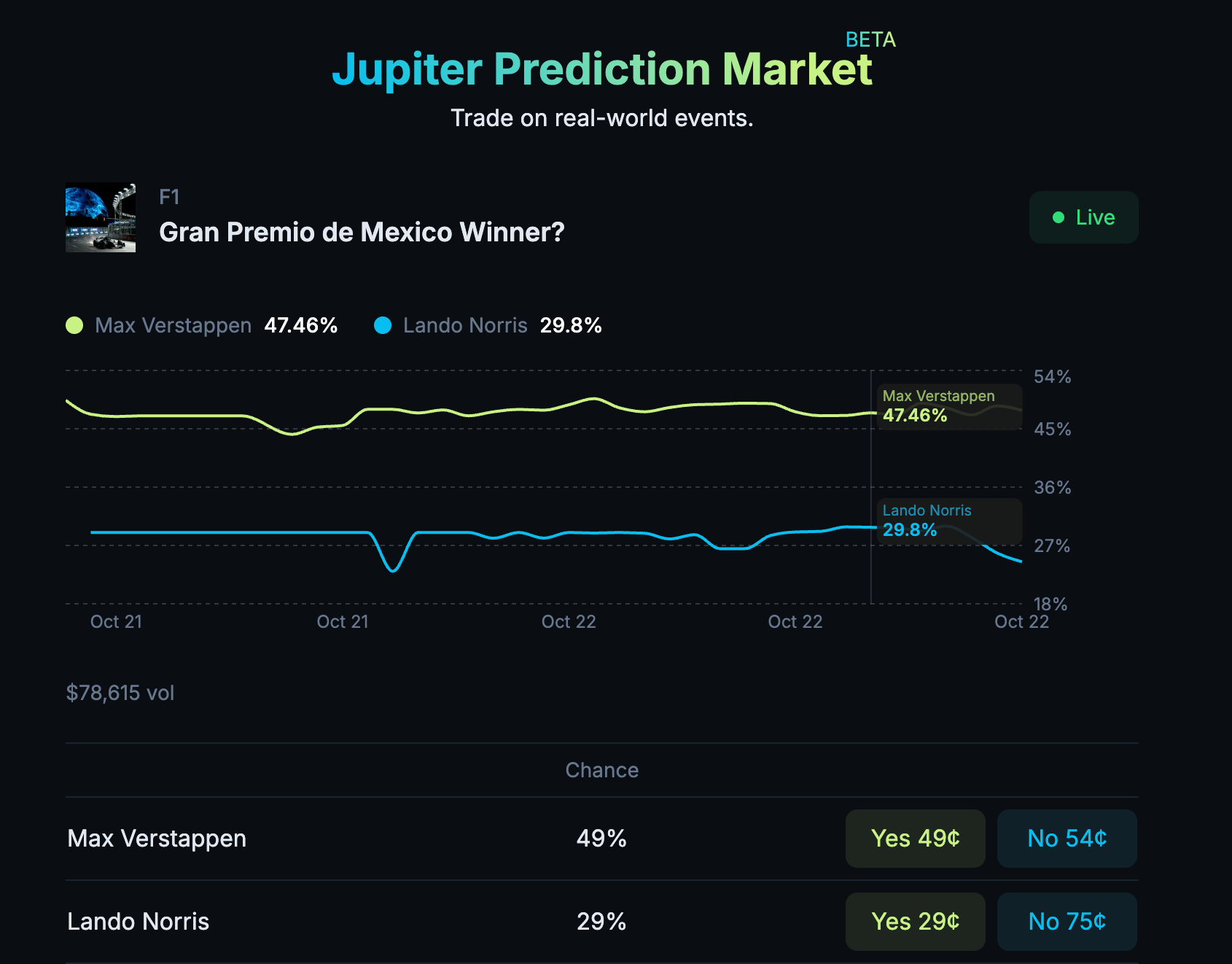Jupiter, one of Solana’s largest decentralized exchanges (DEX) and aggregation platforms, has officially launched the beta version of its first prediction market.
The rollout, supported by liquidity from Kalshi, a U.S.-regulated event-trading platform, marks a important development in blending decentralized finance (DeFi) with real-world event speculation.
With this launch, Jupiter becomes one of the first major decentralized platforms to bridge on-chain trading with regulated prediction markets. The beta version allows users to speculate on specific real-world outcomes, starting with one of the most anticipated sporting events of the year, the Formula One Mexico Grand Prix.
In its official post, Jupiter announced:
“Max Verstappen, or Lando Norris? Oscar Piastri or George Russell? Jupiter’s first ever Prediction Market is now LIVE (in beta). Powered by @Kalshi liquidity, you can trade on the F1 Mexico Grand Prix Winner.”
The launch highlights the project’s goal to merge transparency, accessibility, and compliance within the DeFi ecosystem.
How the Jupiter prediction market works
The Jupiter prediction market enables users to bet on the outcomes of real-world events by buying or selling “yes” and “no” shares that correspond to specific predictions. For example, traders can purchase “yes” shares if they believe Max Verstappen will win the race, or “no” shares if they think otherwise. Each event outcome is tokenized and tradable, with prices fluctuating in real-time based on supply and demand.
Once the event concludes, smart contracts automatically settle the market. Winning “yes” shares pay out $1 each, while losing positions expire worthless. This on-chain automation guarantees fast and transparent settlement, reducing potential disputes common in off-chain event markets.
How does it work?
— Jupiter (🐱, 🐐) (@JupiterExchange) October 22, 2025
Every market has a series of choices where you can trade on either YES or NO.
The price of these positions change and you can sell them at any time before the market ends.
However, at the conclusion you’ll receive $1 per ‘correct’ position and $0 otherwise. pic.twitter.com/8srflbgtDV
Because the platform is in beta, Jupiter has implemented position limits to ensure market stability and prevent excessive exposure. The global cap is set at 100,000 total contracts, and each participant may hold up to 1,000 per position.
During early trading, market data showed strong engagement, with over $78,000 in volume within the first few hours. Dutch-Belgian racer Max Verstappen led the market with 49% of the bets, followed by Lando Norris at 29%, and Oscar Piastri with 22%. The prediction market for the Mexico Grand Prix will remain active until October 27, when the main race concludes and final settlements occur.

Kalshi integration enhances liquidity and credibility
Kalshi’s involvement gives Jupiter’s prediction market a strong foundation of professional-grade liquidity and data support. As a CFTC-regulated market operator in the U.S., Kalshi provides compliance and stability that are rare among decentralized prediction platforms.
This integration ensures that markets maintain consistent trading depth, narrow bid-ask spreads, and resistance to manipulation. Kalshi’s regulated infrastructure provides Jupiter users with institutional-level safeguards, attracting both DeFi natives and traders from traditional finance backgrounds seeking exposure to event-driven assets.
The collaboration also merges the benefits of decentralized technology with real-world regulatory frameworks, a hybrid model that could serve as a blueprint for future decentralized prediction systems.
Impact on the DeFi ecosystem
The introduction of the Jupiter prediction market represents a major step forward for decentralized finance. By integrating event trading, Jupiter expands the use cases of DeFi beyond conventional tokens and yield farming. Participants can now engage with real-world events, sports, crypto prices, and economic data, using decentralized tools.
Adding Kalshi’s regulated liquidity helps ensure that these markets remain fair and transparent, addressing a long-standing challenge for DeFi-based prediction projects. Jupiter’s experiment could encourage regulatory agencies and DeFi innovators alike to find middle ground in designing compliant on-chain prediction products.
According to DeFiLlama data, prediction markets collectively hold $241.9 million in total value locked (TVL), with Polymarket currently dominating the sector. However, Jupiter’s entry, leveraging Solana’s high-speed infrastructure and Kalshi’s compliant liquidity, positions it as a strong new competitor within this growing segment.
What’s next for Jupiter
Following the success of the beta launch, Jupiter plans to expand its prediction market offerings to cover more categories, including crypto price movements and macroeconomic data. The team also aims to integrate cross-chain trading capabilities and strengthen liquidity partnerships.
In the long term, Jupiter envisions building a multi-layered ecosystem that unites decentralized exchange aggregation, predictive trading, and event-based finance under a single platform.
If the collaboration with Kalshi continues to evolve smoothly, Jupiter could help define a new class of regulated yet decentralized financial products, blending compliance, transparency, and accessibility for a global audience.

Disclaimer: All materials on this site are for informational purposes only. None of the material should be interpreted as investment advice. Please note that despite the nature of much of the material created and hosted on this website, HODL FM is not a financial reference resource, and the opinions of authors and other contributors are their own and should not be taken as financial advice. If you require advice. HODL FM strongly recommends contacting a qualified industry professional.





